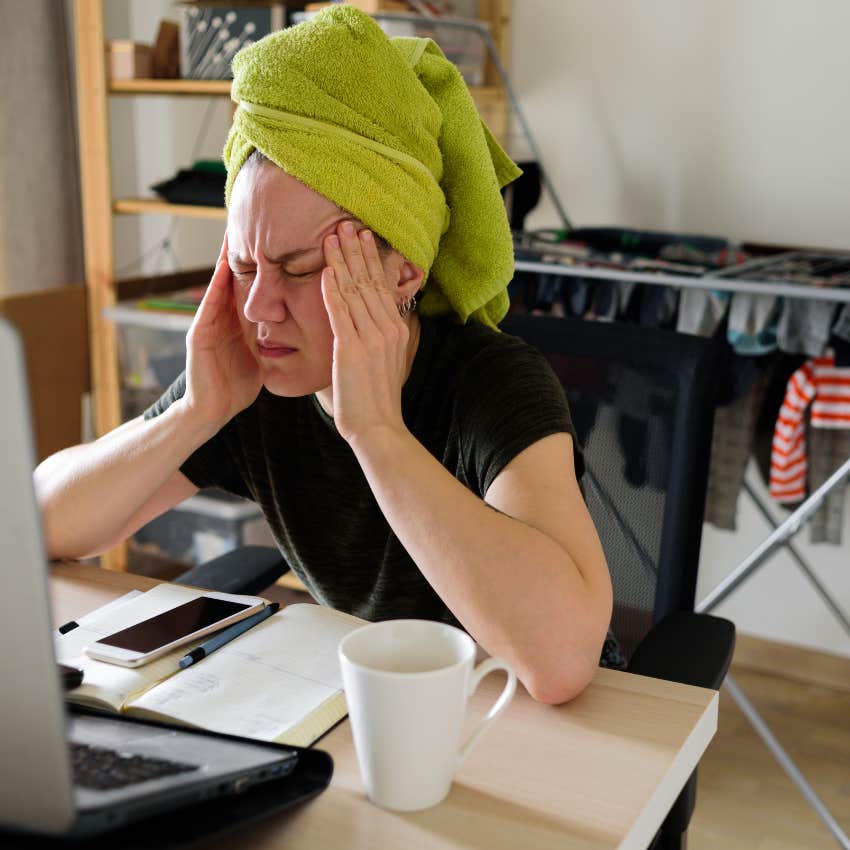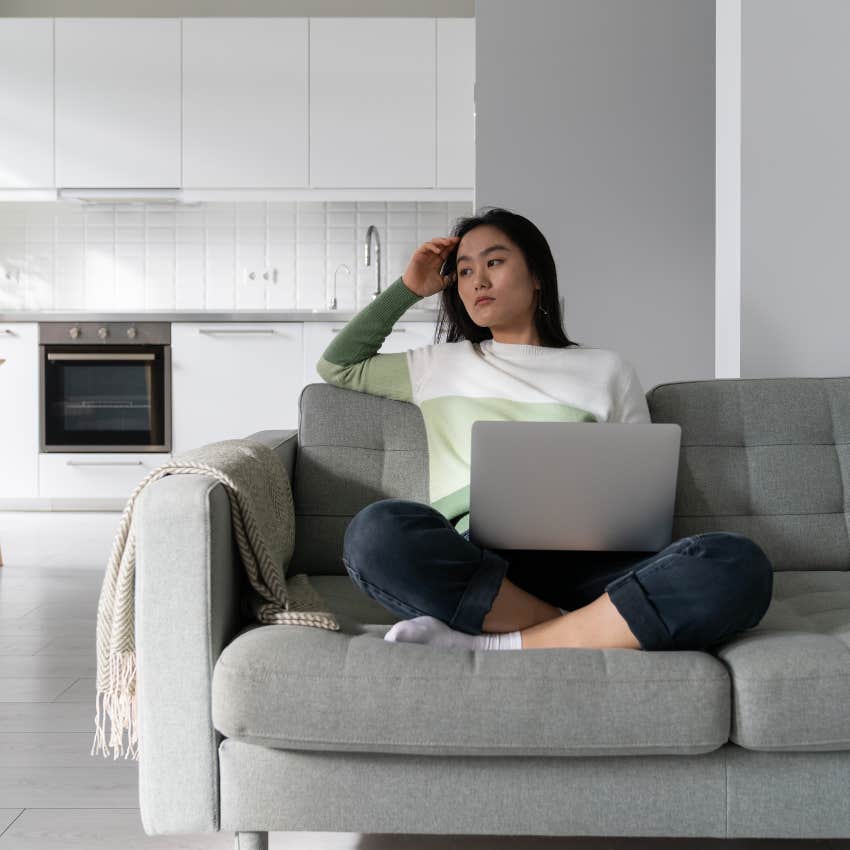Gen Z Are Opening Up About Experiencing 'Work From Home Depression'
Many of them admitted to feeling a sense of loneliness and isolation due to their remote jobs.
 Girts Ragelis / Shutterstock
Girts Ragelis / Shutterstock As of 2023, 12.7% of full-time employees work from home. And while the appeal of being able to work from the comfort of either your home or anywhere else is highly favorable, there have been some work-from-home employees who've opened up about the downside of remote work.
In several TikTok videos, various content creators who work from home have admitted to feeling a sense of isolation and loneliness.
Some Gen Z workers have opened up about feeling 'work-from-home depression.'
Many young remote workers have taken to social media and admitted to feeling as if they are stuck in a rut and have labeled it as being "work-from-home depression." One of those remote workers is a UK-based content creator named Grace, who posted a TikTok video in October 2023 about the struggles she's finding in her job.
"I can't be the only one going through this work-from-home depression right now, especially since it's going to rain for the next five months, I might not leave the house," Grace said. "I've literally gone from bed, straight to my laptop."
Grace explained that on a good day, she would take a walk or go to the gym just to switch up her environment. However, when she got home, she admitted to vegging on her couch and watching mindless videos on social media until bedtime. Grace recalled telling her boyfriend about her monotonous daily routine and the impact it had on her mental health.
"I don't wanna do this anymore but equally, I start looking for a new job or whatever and realize that I don't wanna go into the office every day either and have to deal with a commute and talking to people and having to put on makeup. Struggling to find a solution."
 Photo: Tatyana / Canva Pro
Photo: Tatyana / Canva Pro
Grace acknowledged that it's gotten to the point where she spends all her time inside and when it's time to go out and socialize, she never wants to.
In another video, a TikTok creator named Bemsie posted a similar rant as Grace, explaining that her days are filled the same: waking up when her alarm goes off, grabbing her laptop, and working from her bed for two hours before eventually moving again.
"Then I get distracted and go on TikTok with Netflix in the background, and then I'm distracted on my phone," Bemsie said. She claimed that with all of the distractions that happen because she's working from her home, at the end of the day when she clocks out, she ends up laying awake in bed for hours only to do the same thing again the next day.
"And then eventually I fall asleep because I'm so tired I can't keep my eyes open. And it's like 4 a.m. at this point. And then the alarm goes off at 9 again the next morning," she continued. Just like Grace, Bemsie explained that when the weekend eventually comes around, she doesn't have the energy to go out and be around her friends.
Many remote workers have admitted to increased mental health challenges because of their work environments.
While there is a value in being able to work from home, many employees have opened up about the personal cost of it all as well. According to the Society for Human Resource Management, about eight out of 10 employees (82%) say they have felt lonely at work.
 Photo: dimaberlinphotos / Canva Pro
Photo: dimaberlinphotos / Canva Pro
Similarly, in a May 2021 survey by the American Psychiatric Association (APA), only one in five remote employees reported that their employer has offered additional mental health services since the start of the pandemic. The online survey of 1,000 remote workers between March and April 2021, found that a majority of them said they experienced negative mental health impacts, including isolation, loneliness, and difficulty getting away from work at the end of the day.
There are ways to break away from the monotonous routine when working from home.
In a video, a TikTok content creator named Beth offered advice to work-from-home employees who may feel stuck in a rut, and how they can break away from a monotonous routine.
"The one thing that genuinely helped me go from working-from-home depressive to actually enjoying it is getting that work-life balance. If you wake up and go straight to work, you are gonna dread it every single day."
Beth recommended trying to do something for yourself, even if it's staying in bed for an extra hour in the morning. She also advised trying to stay off of technology in the mornings until you're ready to clock in for your job.
As someone who also struggles with trying to find a healthy work-life balance, the best thing that works for me is trying to get out of my apartment. Even if it's going for a walk, or changing up the scenery and working from a coffee shop, library, or coworking space. If you can't do any of that, then simply moving around your space during the day can prove to help break up the day and not find yourself stuck in a monotonous routine.
 Photo: RossHelen from Getty Images / Canva Pro
Photo: RossHelen from Getty Images / Canva Pro
As for the socialization aspect of remote work, sometimes it takes forcing yourself to spend time with friends to realize that it was something you needed all along. There have been countless times when I've tried to make excuses because I've gotten so used to spending all my time in my apartment, but those moments when I've just decided to say yes, I've never regretted it.
The best remedy for combatting loneliness is surrounding yourself with people who bring you joy, even if it's just something simple like having a movie night or grabbing dinner with your closest friends or even family. Making the conscious effort to balance remote working with the life you lead outside of work is extremely important as that ends up affecting our productivity and overall mental health because we should never be living to work.
Nia Tipton is a Chicago-based entertainment, news, and lifestyle writer whose work delves into modern-day issues and experiences.
